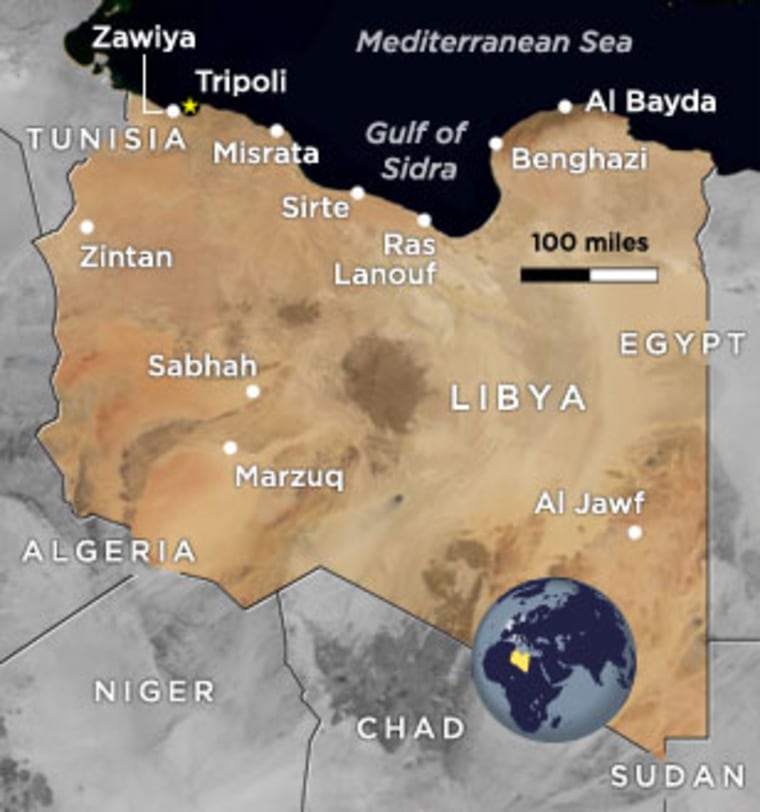Forces loyal to Moammar Gadhafi drove hundreds of rebels from a strategic oil port in a counteroffensive Thursday that reversed the opposition's advance toward the capital Tripoli and now threatens its positions in the east.
"I have two words to our brothers and sisters in the east: We're coming," Saif al-Islam Gadhafi, the Libyan leader's most prominent son, told a cheering crowd of young supporters in Tripoli.
The U.S. on Thursday said it would send disaster relief teams to eastern Libya, while Britain and France urged the European Union to recognize the rebels as a government.
But there was no concrete sign of Western moves toward military assistance — such as the no-fly zone that the rebels pleaded for as they retreated through the pancake-flat desert scrubland outside the port of Ras Lanouf, scanning the skies for government warplanes.
The fleeing rebels said government forces showered rockets and tank shells on Ras Lanouf in preparation for a full-scale advance. Lightly armed opposition members sped back to their territory by the hundreds, fleeing eastward in cars and pickup trucks mounted with machine guns.
Civilian structures, including a large mosque, were destroyed, a human rights activist told msnbc.com.

A rebel official in the town of Ajdabiya inside opposition territory said Gadhafi's troops and tanks battled the insurgents at the western entrance to Ras Lanouf and used gunboats to fire on the rebels from the sea.
"These are tough battles," said Akram al-Zwei, a member of the post-uprising town committee. "We are fighting against four battalions heavily equipped with airpower, tanks, missiles, everything."
A rebel fighter who fled the city after nightfall said it still had not fallen to the regime.
"They are still bombing it from the air, the sea and with rockets, but the ground forces have not come in," Mohammed el-Gheriani said, carrying a Kalashnikov rifle.
Taking back Ras Lanouf would be a major victory for Gadhafi, reestablishing his power over a badly damaged but vital oil facility and pushing his zone of control farther along the main coastal highway running from rebel territory to the capital, Tripoli.
The rebels' capture of Ras Lanouf a week ago had been a major victory as they pushed along Libya's long Mediterranean coastline toward Tripoli, in the far west of the country. A day after seizing it, their forces charged farther ahead, reaching the outskirts of Sirte, Gadhafi's hometown and the bastion of his regime in the center of the country.
A rebel governing council spokesman said Gadhafi's air force, army and navy had bombarded Ras Lanouf, targeting the main hospital, mosques and civilian areas.
"The regime that has lost legitimacy is practicing a scorched earth policy," spokesman Abdel-Hafidh Ghoga said. "We have requested for all steps to be taken to protect the Libyan people. We believe the U.N. can do that."
The main hospital in Ras Lanouf was hit by artillery or an airstrike and the rebels are pulling their staff out and evacuating patients to the towns of Brega and Ajdabiya, said Gebril Hewada, a doctor on the opposition's health committee in the main eastern city of Benghazi.
Control of oil
In the last week, both sides have fought for control of two of the country's largest oil facilities.
On Wednesday, Libya's oil minister said production has been cut by two-thirds since the unrest began, but the government was still firmly in control of the country's resources.
Not exactly, oil workers at the terminal in Tobruk in eastern Libya told NBC's Stephanie Gosk.
It's an active port — peaceful, operational and completely rebel-held. Two tankers have already left this month, one to Italy two days ago, with $160 million in revenue flowing not to the Gadhafi government but instead to the opposition.
"I think the money is going to go to the Libyan people, the people who are really in need of the money," said Anwar Hasan, a safety specialist who has worked in Tobruk for 20 years.
'Civil war,' Red Cross says
The rebel hospital in the eastern town of Brega said four were confirmed dead in the fighting, 35 were wounded and 65 were missing.
Insurgents also reported an air strike on Brega, another oil port 50 miles east of Ras Lanouf, indicating that Gadhafi loyalists had not only halted a westwards insurgent push in its tracks but were making inroads into their eastern hinterland.
The news came as the International Committee of the Red Cross said Libya was in a state of "civil war" and warned that increasing numbers of wounded civilians were arriving in hospitals in eastern cities.
ICRC President Jakob Kellenberger called on Libyan authorities to grant the humanitarian agency access to western areas, including Tripoli, and reminded both sides that civilians and medical facilities must not be targeted.
"We have now a non-international armed conflict, or what you would call civil war," Kellenberger told a news conference.
Gebril Hewadi, of the medical management committee, told Reuters television at least 400 people had been killed in eastern Libya since clashes began there on Feb. 17, with many corpses yet to be recovered from bomb sites.
In the city of Zawiya, not far from the capital Tripoli in the country's west, there has also been fierce fighting as Gadhafi tries to drive out the rebels.
"This is a life or death battle for us, we have nothing to do now but to fight him," a rebel fighter, who gave his name as Ibrahim, told Reuters by telephone.